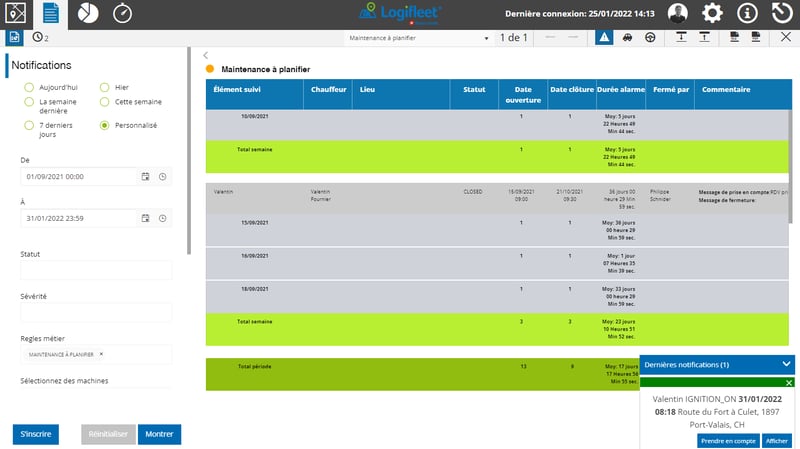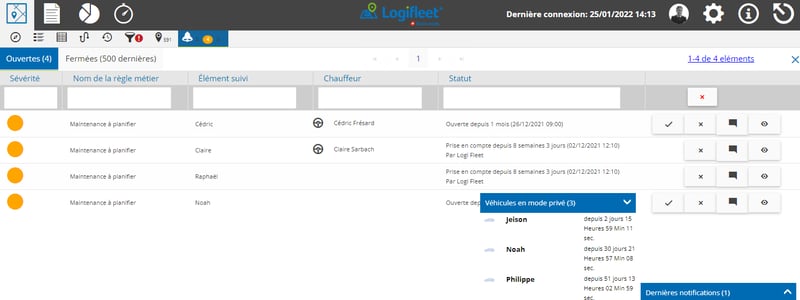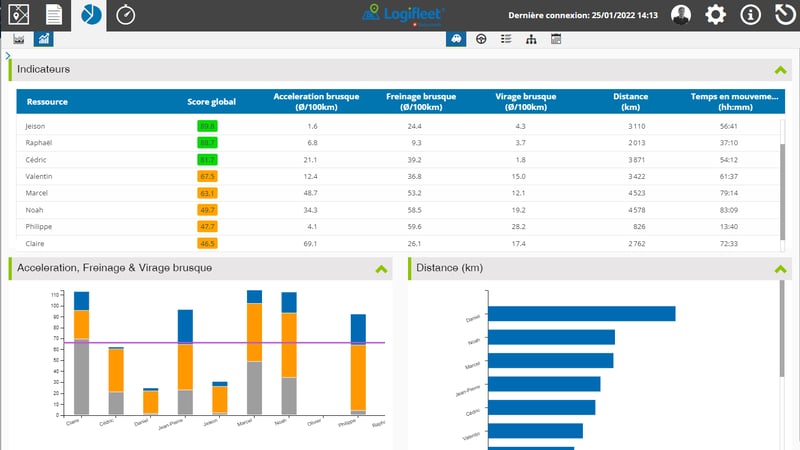- Home
- Logifleet Blog
- Fleet reporting: all you need to know to manage your fleet efficiently
Fleet reporting: all you need to know to manage your fleet efficiently

If you're in charge of a fleet of vehicles, you know that tracking and managing them can be a real headache. Still, it is a critical task for businesses of all sizes. When done well, it helps with optimizing resources and improving efficiency.
Fleet management needs to keep a close eye on all operational costs, from fuel (especially after the fuel costs rise caused by the latest global events) to maintenance, and reporting is the best way to do it. That said, it can be overwhelming for business owners who are not familiar with the terminology or process. Luckily, there are tools and techniques available to help you keep your entire fleet running smoothly.
In this post, we'll go over everything you need to know about the structural fleet reports – from what data to collect to how to use it to improve your operations. So if you're ready to take your management game up a notch, keep reading!

What is fleet reporting?
Fleet reports are a collection of data that provide information on all fleet operations. It can encompass anything from vehicle diagnostics and driver safety to fuel usage and maintenance costs.
The purpose of fleet management is to ensure the fleet's safe operation and optimize its use. Fleet reporting aims to provide information that helps managers do exactly that. A good report will consist of all fleet-related activities as well as issues that need to be improved.
The importance of fleet reporting
Let's think for a second about everything fleet managers have on their plate. Their responsibilities include scheduling service appointments, monitoring vehicle inventory and diagnostics, tracking fuel usage, and much more. If they are not careful with their reporting strategy, they could miss some important details. And that might lead to operational issues down the road.

Fleet reporting allows you to have a clear picture of your fleet's performance. You can use its information to improve efficiency and productivity and reduce costs to maximize profitability.
It also has obvious safety implications. Tracking driver behavior helps identify risky driving habits. By eliminating them, you can reduce fuel consumption and save on gas costs.
Three-quarters of organizations lack the skills and technology to use data effectively. They may collect it, but they fail to organize, measure and analyze it for insight and planning. And that's what good and timely fleet reports can help you do. Use them to avoid costly mistakes, keep your fleet running smoothly and keep up with the competition.
What data should you include in fleet reports?
The actionable information you'll include will depend on your fleet and business goals. For example, Logifleet’s customers often include the following to their business goals:
- Reducing costs, optimizing and digitalizing work schedules, and increasing profitability per trip
- Reduction of unnecessary journeys, correct data on vehicle usage for private and business purposes
- CO2 emissions reduction, improvement of environmental footprint of construction sites, and effective usage of time and resources
That said, let’s take a look at some key metrics that every fleet manager should keep an eye on:

Fuel consumption
Tracking fuel usage is a great way to monitor fleet expenses and optimize operations. For example, if specific routes are using up too much gas, you can make changes to reduce operating costs and improve efficiency. Tracking fuel consumption in fleet reports also includes fuel purchases, fleet consumption rates, and individual vehicle consumption rates.
Logifleet’s solution allows you to get reliable information that keeps your fleet safe and reduces costs to a minimum. The following images include a screenshot from a platform showing your vehicle odometer and consumption (CAN bus), data for thermal car, electric and hybrid vehicles, vehicles with open issues, all relevant dates, and more.


Maintenance costs
Keeping track of maintenance costs is essential for two reasons. First, it allows managers to budget appropriately for future repairs. Second, it can help identify any problems with the fleet that may need attention. Maintenance reports can include details such as when each vehicle was last serviced or what type of service it received at the time.
As seen bellow, you can manage preventive maintenance costs using a fleet management software. With custom notifications you will get informed as soon as the vehicle issue occurs, allowing you to make timely decisions.

Vehicle diagnostics
This data can help you identify any problems with your vehicles before they become serious issues. It also allows you to track service and repair costs, which can help you make sure your fleet is running efficiently in the long run. Vehicle diagnostics can include GPS location tracking and engine performance data such as fuel levels, odometer readings, etc.
Driver behavior
As mentioned before, monitoring driver behavior allows you to identify any issues that may be putting the fleet at risk or causing drivers unnecessary stress. It can include things like speeding, hard braking, and sharp turns. For example, if one of your drivers is consistently speeding on a particular route, you could coach tehm or reassign them to another job where they won't be a danger to themselves or others.
Ideally, you would want your drivers to follow the concept of eco-drive and reduce CO2 emissions from your fleet. By following the metrics from the dashboard of your fleet management software, you can evaluate your driver’s performance with a rating system and identify strengths, weaknesses, and training needs.

How to collect data for fleet reporting
The first step in creating a good fleet report is, naturally, to gather data. We can access the data from many sources, including fleet management systems, GPS logs, and fuel cards.
What you will collect will depend on the specific needs of your business. For fleet management, fleet reports are usually based on the following metrics:
- Average fuel cost per mile
- Total miles driven by fleet vehicles each month
- The average time it takes to complete a trip or job
- Number of jobs completed each day
Once you have the information you need, it's important to organize it in a way that makes sense for reporting structure. This usually means sorting it by type of vehicle, route, or driver. Once you organize it, you can begin measuring and analyzing it to see how it impacts your fleet.

How do you analyze fleet data?
Once you collect and organize the data you need, it's time to analyze it. There are many different ways to do it, but the most common is to create reports showing trends over time or across vehicles in the fleet. If your fleet is large enough, you should compare fuel costs with those of other fleets in similar industries. That way, you can ensure your fleet will remain competitively priced and profitable.
We can break down the data analysis process into four steps:
- First, identify the metrics that are most important to your business. These could include fuel consumption rates for each vehicle type or driver behavior on specific routes.
- Second, measure and track these KPIs over time so you can see if there are any trends or patterns that need attention.
- Third, analyze the data to determine why certain metrics have changed and what you can do about it. If a fleet driver is speeding more often than other drivers on similar routes, maybe they're trying to make up for lost time due to traffic congestion somewhere else along their route.
- Fourth, use the data to make informed decisions. If you see that the average time it takes to complete a job is increasing, you may need to hire more drivers or reevaluate your current routes. Using the data to communicate issues with the employees is the final and most important aspect of data analysis process.

Fleet management solutions
Now that we've covered all the things fleet managers need to keep track of their fleet's performance, let's talk about tools that can make their lives easier. The fleet management software is designed to help managers make data-driven decisions. It allows you to track, analyze, and report on fleet performance in real-time. That way, you can quickly identify areas of improvement or risk within your business.
When looking for fleet management software, it's essential to find one that offers the most important features to your business. You should also make sure the system is compatible with the devices you use, such as GPS trackers and fuel cards.
In the end, it's not just about the technology and platform the solution offers. Associated services and dedicated resources from the software provider can make your investment successful or a failure.
Solutions such as Logifleet's can help you keep track of any important data for your particular activities. A single platform includes things like service schedules, fuel usage, and driver safety for various industries, from construction to transportation.
In summary
Fleet reporting is a vital management tool that helps assess fleet performance and make informed decisions. A sound fleet management system doesn't just make it easy to collect data. It enables you to analyze trends over time or across vehicles and identify issues affecting your efficiency and profitability.
Make sure you choose the right solution and partner for your business and use reports to make the most of your fleet. If you're looking for reliable and easy-to-use fleet management software, make sure to check out logifleet.ch!
En Budron H9
CH-1052 Le Mont s / Lausanne
T +41 21 651 06 51
Merkurstrasse 25
CH-8400 Winterthur
T +41 71 277 52 47